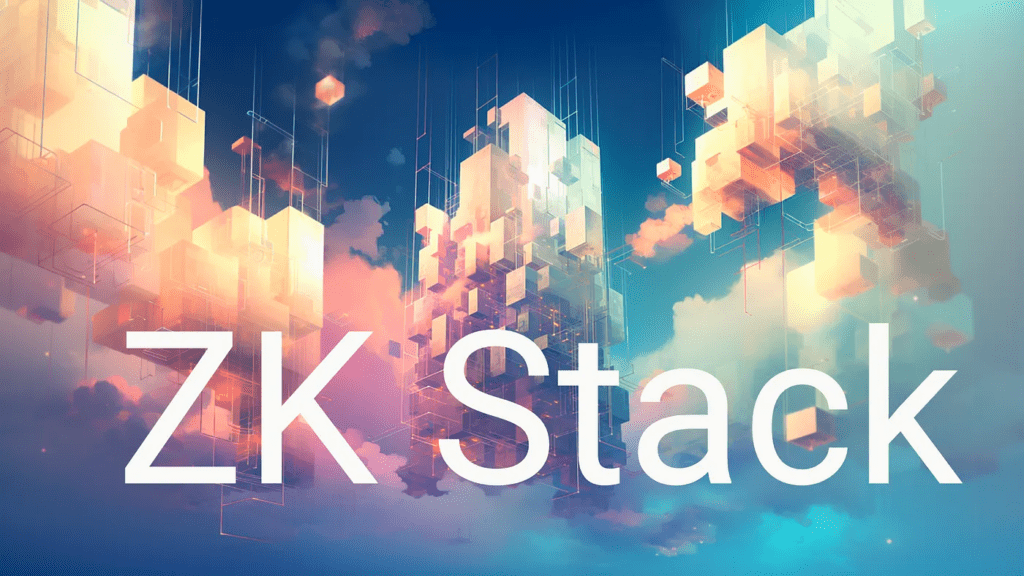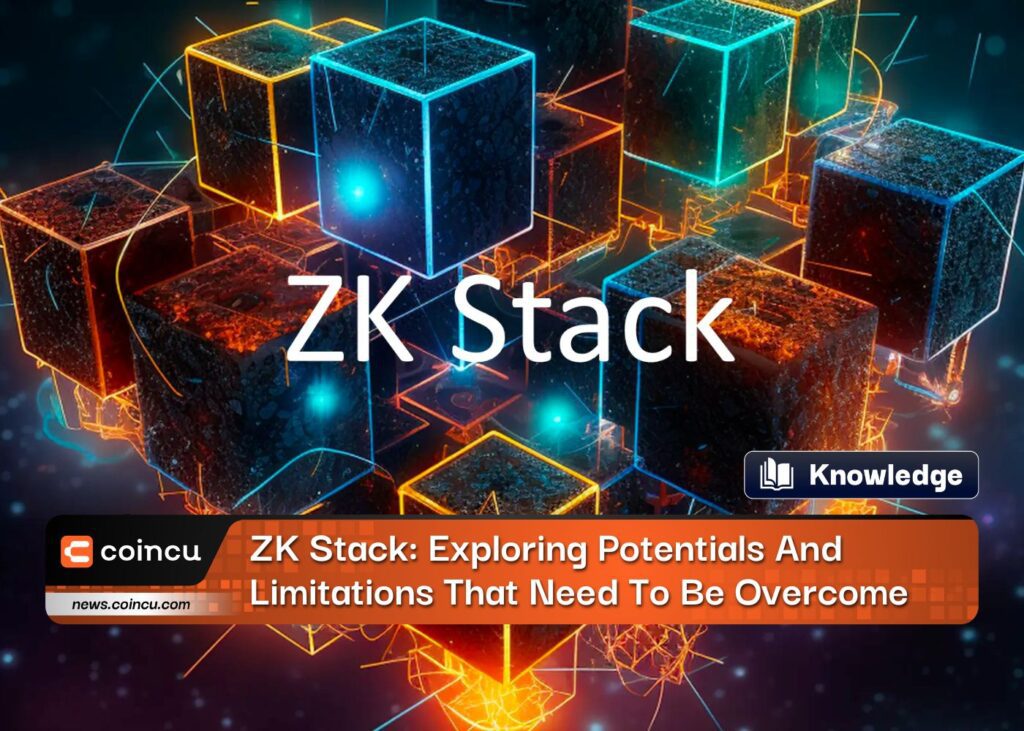Key Points:
- ZK Stack, a powerful Hyperchain building toolkit, is based on the open-source code of zkSync Era, utilizing cryptographic zero-knowledge proofs for indisputable transaction verification.
- Advantages include enhanced scalability with 1,000 times cheaper transaction fees, customizable data availability, empowering tokenomics, and tailored development options.
- Challenges involve incomplete customization, dependency on zkSync Era, relatively lower interest compared to competitors, and potential interoperability issues with Layer 3 solutions in crowded networks.
zkSync has just announced the launch of ZK Stack – the Hyperchain building toolkit based on the open source code of zkSync Era. So what are the advantages and disadvantages of this toolkit? Let’s find out more details about Coincu through this article.

What is ZK Stack?
ZK Stack has emerged and offered a powerful solution for building highly customizable blockchains. Comprising both Layer 2 and Layer 3 components, collectively known as Hyperchains, the toolkit is based on the open-source code of zkSync Era, showcasing its commitment to transparency and community collaboration.
The standout feature of ZK Stack lies in its implementation of cryptographic zero-knowledge proofs for Layer 2 transactions. Unlike the prevalent “optimistic” approach to rollups, which assumes transactions are valid unless proven otherwise, ZK Stack leverages zero-knowledge proofs, providing indisputable verification of transaction validity. This approach sets it apart from two notable counterparts in the field – Optimism’s OP Stack and Arbitrum’s Arbitrum Orbit, both of which are Optimistic Rollup solutions.
Notably, zkSync Era is leading the pack as the pioneer Hyperchain, blazing the trail in the liquidity network. ZK Stack distinguishes itself as a technology-oriented amalgamation of the Modular Blockchain and the Internet Of Blockchain.
Key among ZK Stack’s offerings are two fundamental features: Sovereignty and Seamless Connectivity. With Sovereignty, creators wield complete ownership rights over the source code, empowering them to customize and shape every aspect of the chain according to their vision and requirements. This level of freedom is an enticing proposition for developers seeking to bring their unique ideas to life on the blockchain.
On the other hand, Seamless Connectivity ensures that Hyperchains operate independently, relying solely on Ethereum for survival and security. Additionally, ZK Stack introduces Hyperbridges, facilitating seamless interconnection among all Hyperchains. This innovative solution ensures reliable interoperability between chains, enabling swift and cost-effective transactions within minutes at the price of a single transaction.
The introduction of ZK Stack adds a new dimension to the blockchain ecosystem, catering to the diverse needs of developers, businesses, and end-users alike. By incorporating zero-knowledge proofs and providing customizable solutions, the platform is poised to drive a wave of innovation and adoption in the decentralized space.
Pros and Cons
Pros
The innovative design of ZK Stack comes packed with a host of advantages, setting it apart as a game-changer in the blockchain landscape. Let’s explore some of the key benefits that make the toolkit a force to be reckoned with:
- Scalability Boost with ZK Technology: The integration of ZK technology in ZK Stack brings a significant improvement in scalability, particularly concerning transaction speed and fees. Compared to other Rollup platforms currently available, it offers transactions at a fraction of the cost, approximately 1,000 times cheaper. This remarkable cost efficiency makes it an attractive option for developers and users alike.
- Optimized Scalability with Customizable Data Availability: ZK Stack takes scalability on Hyperchains to the next level by introducing the concept of customizable Data Availability through zkPorter’s technology. This enhancement results in near-instant transaction speeds and near-zero transaction fees, a powerful combination that ensures seamless and cost-effective blockchain interactions.
- Empowering Tokenomics Customization: ZK Stack’s flexibility extends to Tokenomics, allowing developers to customize the Native Tokens of their Hyperchains. This adaptability enhances the value of Native Tokens in the eyes of the community, fostering a strong growth engine for active and efficient Hyperchains. Such community engagement holds the potential to drive widespread adoption and long-term sustainability.
- Tailored Development with Customization: ZK Stack’s versatility is evident in its multiple levels of customization, empowering developers to build Layer 2 (L2) or Layer 3 (L3) platforms that align perfectly with their specific needs and visions. This streamlined approach not only fosters creativity and innovation but also accelerates the development process, enabling quicker deployments of novel blockchain solutions.
- Proven Success with zkSync Era: ZK Stack draws inspiration from the achievements of zkSync Era, which has been garnering widespread recognition and success in recent times. This successful implementation serves as a testament to the efficacy of the ZK Stack model and instills confidence in developers seeking to build their own Hyperchains using this framework.
- A Promising Model: Drawing parallels with other successful projects in the blockchain domain, such as Optimism’s Superchain and Cosmos’ Internet of Blockchain, positions ZK Stack as a promising contender in the realm of blockchain solutions. The underlying principles of this model and its proven success stories contribute to the optimism surrounding the potential accomplishments of ZK Stack.
Cons
While ZK Stack presents a compelling array of advantages, it’s essential to acknowledge and address the challenges it faces to achieve its full potential. Let’s explore some of the notable disadvantages of the toolkit and how they can be mitigated:
- Incomplete Customization: One of the drawbacks of ZK Stack is that its customization capabilities are not yet fully maximized. As the platform continues to evolve, developers may find themselves somewhat constrained in certain aspects, particularly in terms of building exclusively on Ethereum and focusing heavily on Zero-Knowledge Proofs (ZKP). To overcome this limitation, the ZK Stack team must actively seek feedback from the developer community and explore opportunities to expand the range of supported technologies and interoperability with other blockchain ecosystems.
- Dependency on zkSync Era: ZK Stack’s development and upgrades are inherently tied to the progress of zkSync Era. While this shared foundation may facilitate compatibility and cohesion between the two, it also means that any advancements or setbacks in zkSync Era could directly impact ZK Stack and vice versa. To address this issue, the developers should consider making it more modular and agnostic to specific Layer 2 implementations, allowing for greater flexibility and autonomy in upgrades and compatibility with other Layer 2 solutions.
- Relatively Lower Interest Compared to Competitors: Despite its promising features, ZK Stack has yet to gain the same level of attention and adoption as its competitor, Optimism’s OP Stack. The competition in this space is fierce, and the advantages of ZK Stack, such as zkEVM, need to be effectively communicated to the blockchain community. Proactive marketing, engaging developer outreach, and strategic partnerships can help elevate the profile of ZK Stack and attract more interest from the broader blockchain ecosystem.
- Potential Interoperability Challenges: As the network grows and becomes more crowded, interoperability between Layer 3 (L3) solutions on different Layer 2 (L2) platforms could pose a challenge for zkSync. Ensuring smooth and efficient communication between disparate L3s will be crucial to maintain the seamless operation of Hyperchains. zkSync should invest in research and development to tackle potential scalability and interoperability hurdles, collaborating with other projects in the space to establish industry-wide standards for cross-chain interactions.
Conclusion
In conclusion, ZK Stack emerges as a groundbreaking platform that leverages the power of zero-knowledge technology, customization, and successful precedents to revolutionize the blockchain landscape.
With its focus on scalability, cost-effectiveness, and developer empowerment, ZK Stack paves the way for a new era of decentralized applications and Hyperchains, fostering a thriving ecosystem of innovation and growth.
However, ZK Stack exhibits remarkable potential and unique advantages, it also faces certain limitations that require diligent efforts to address.
DISCLAIMER: The information on this website is provided as general market commentary and does not constitute investment advice. We encourage you to do your own research before investing.





